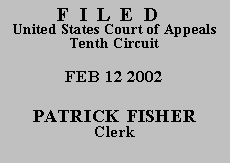

|
THOMAS LEE TAYLOR, |
(District of Wyoming) |
Before KELLY, McKAY, and MURPHY, Circuit Judges.
This case is before the court on Thomas Lee Taylor's pro se request for a certificate of appealability ("COA"). Taylor seeks a COA so that he can appeal the district court's denial of his 28 U.S.C. § 2241 habeas petition.(1) In his petition, Taylor asserted that he was denied procedural due process during his parole revocation hearing, that his parole revocation was based on a citation that was later dismissed in state court, and that the parole board should not have denied him credit for "street time" which accrued while he was on parole. In denying Taylor's petition, the district court concluded that Taylor was afforded all of the process he was due. The district court further concluded it was irrelevant that the citation underlying the parole revocation was eventually dismissed in state court because the burden of proof in parole revocation proceedings was significantly lower than that in criminal prosecutions. This court has undertaken a thorough review of Taylor's request for a COA and appellate brief, the district court's order, and the entire record on appeal. That review demonstrates that the district court's resolution of Taylor's petition is not debatable or deserving of further proceedings. See Slack v. McDaniel, 529 U.S. 473, 483-84 (2000). Accordingly, Taylor has not made a "substantial showing of the denial of a constitutional right," and is not entitled to a COA. 28 U.S.C. § 2253(c)(2).
Taylor's request for a COA is DENIED for substantially those reasons set out in the district court's order dated June 11, 2001. The appeal is hereby DISMISSED.
ENTERED FOR THE COURT
Michael R. Murphy
Circuit Judge
*. This order and judgment is not binding precedent, except under the doctrines of law of the case, res judicata and collateral estoppel. The court generally disfavors the citation of orders and judgments; nevertheless, an order and judgment may be cited under the terms and conditions of 10th Cir. R. 36.3.
1.Although Taylor brought his petition under 28 U.S.C. § 2254 and the district court docketed it as a § 2254 petition, Taylor's petition challenges the execution of his sentence rather than its validity. Accordingly, we construe the petition as arising under § 2241. See Montez v. McKinna, 208 F.3d 862, 865 (10th Cir. 2000). No matter how construed, Taylor needs a COA to appeal the denial of his petition. See id. at 869.